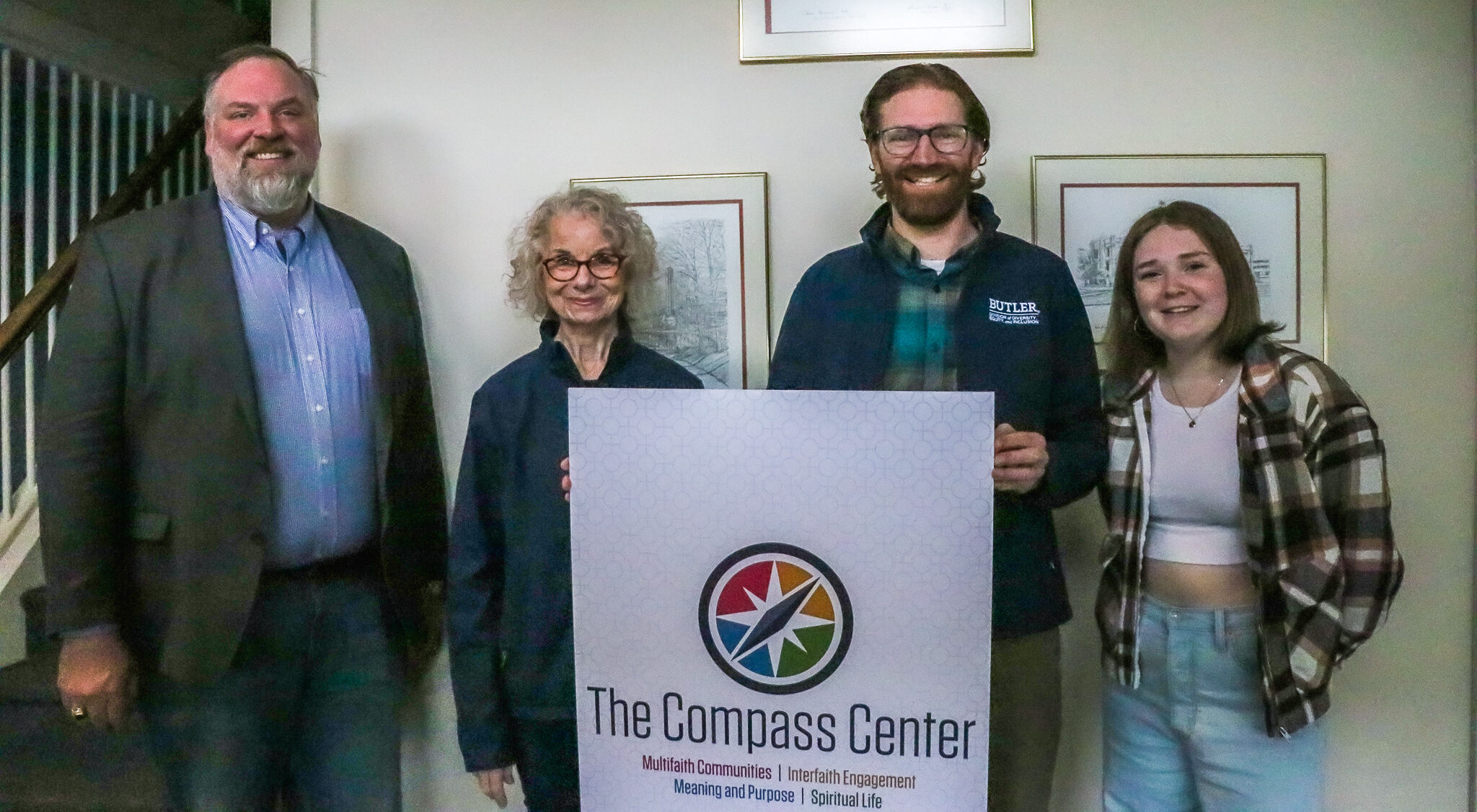Senior lecturer in religion Brent Hege, assistant director Marguerite Stanciu, director Daniel Meyers and communications intern Samantha Plumridge celebrate the name change to The Compass Center. Photo by Natalie Goo.
RYANN BAHNLINE | NEWS CO-EDITOR| rbahnline@butler.edu
OLLIE FITZGERALD | STAFF REPORTER | ofitzgerald@butler.edu
Butler University announced the renaming of the Center for Faith and Vocation to The Compass Center on April 4. An email to the Butler community said the name change was meant to “reflect over two decades of dedication to fostering inclusivity, diversity, and personal growth within and beyond the University community.” The Compass Center will stand on the same four pillars the Center for Faith and Vocation did previously, but now are being branded as “directions” — multi-faith communities, interfaith engagement, meaning and purpose and spiritual life.
Director of The Compass Center Daniel Meyers said that the reason for the name change is to help students think differently about vocation.
“One of the reasons we change the name is to help encourage students to think about what their direction is using this compass language, and what meaning and purpose looks like for different students in different colleges,” Meyers said.
Samantha Plumridge, a junior strategic communication major and communications intern for The Compass Center, believes that the name is a much better fit for the Center’s goals.
“I think it’s great just because I feel like it brings an overall better meaning to what we’re trying to do,” Plumridge said. “It is more generalized and creates a more inclusive environment. So people do not have to feel as if they have to identify a certain way [to participate in the Center].”
A name change for the Center for Faith and Vocation has been in discussion for many years, but momentum really picked up in the past couple of years.
Marguerite Stanciu, assistant director of The Compass Center, said that it was more than just a rebranding and a name change.
“Part of it has to do with updating the branding of our Center, and also the accessibility question having to do with the perception of the Center [and] who is welcome here,” Stanciu said. “That follows in line with our recent joining into the diversity, equity and inclusion division as of August of 2023.”
Meyers elaborated on how the name change began, which started with some consulting conversations in the spring of 2022.
The topics in these initial conversations concerned what the Center was doing well, what its strengths were and what some challenges were. From there, they began to look at student focus groups.
“We started with a group of students who are really well versed in the programming coming out of the [Center] in December of ‘22,” Meyers said. “Then we did a number of focus groups in the spring of ‘23 with students who were not as familiar with the [Center] and just getting lots of input. What we kind of learned was that there was a theme of a lot of students assuming that the word ‘faith’ may [mean] this is a space of Christians.”
Meyers said that this is different from what the vision for the Center is, as they want the Center to be a space that is meant not only for all faiths but students who are atheistic seekers, spiritual and all kinds of different identities.
They also found through these focus groups that not a lot of students knew the meaning of the word “vocation.”
“It was a matter of how we can better communicate a wider, inclusive vision of what it means to be part of this,” Meyers said.
In addition to their staff, The Compass Center worked with Bridge Builder Strategies, specifically with Mike Simmons, a lecturer in the Lacy School of Business, as well as Dr. Khalilah Shabazz, who is the vice president and chief diversity officer of the Division of Diversity, Equity and Inclusion.
Simmons assisted in facilitating focus groups and analyzing the data gathered from these groups. Shabazz worked with the Center to navigate different channels of approval and communicate different decisions through Butler’s leadership.
Stanciu emphasized how multifaceted the approach has been to change the name of the Center.
“All of the credit [for how we were able to implement the change] goes to Butler’s marketing department,” Stanciu said. “We have an account manager, Victoria Ochs, who has worked with us very closely. The manager of web marketing, Nancy Lysand worked with us very closely, the designer within the department, David Downham, came up with all the graphic images. So they’ve done the really heavy lifting on the back end in terms of rebranding our website [and] flipping all these different platforms over. That also includes people such as Katie Palmer, who [works in the] marketing department, helping us create newsletters.”
Meyers said that the name change does not signify a change in the work that will be done in the Center, but a way for anybody on this campus to see themselves as welcome.
“We were learning [that] the words we were using were creating barriers,” Meyers said. “So our hope is that The Compass Center communicates a sense of this is a place for pursuing what matters to you, whatever that may be. Some of it might be the connections you have with that which is higher or most important to you as you think about your own theological commitments. Some of it might be about your own future career and personal commitments and passions. This is what we are hoping to help use The Compass Center to help students find and that’s not new. But it’s also a new way of talking about the same work.”



